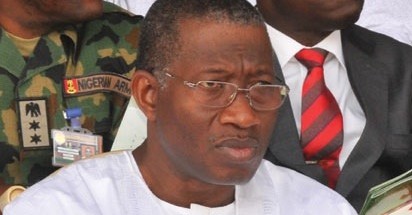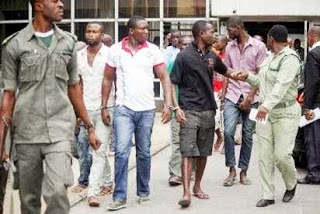Notorious Mexican drug cartel leader arrested
konknaijaboy | On 22, Feb 2014
Guzmán escaped 13 years ago from a Guadalajara-area prison by being wheeled out the door in a laundry cart.
MEXICO CITY — The country’s most notorious drug cartel leader, Joaquín “El Chapo” Guzmán, was arrested early Saturday by Mexican and U.S. officials.
Mexican media say soldiers arrested Guzmán in Mazatlán — a popular tourist destination in Sinaloa state — at a family gathering at a local hotel. The 56-year-old faces multiple federal drug trafficking indictments in the U.S. and is on the Drug Enforcement Administration’s most-wanted list.
Attorney general Jesús Murillo Karam told reporters Saturday afternoon that Guzmán and an unnamed collaborator was captured at 6:40 a.m. by members of the Navy “without a single shot being fired.” He said that medical personnel were called in to confirm Guzmán’s identification.
Media were allowed to take pictures of Guzmán as he was marched to a helicopter by soldiers.
Guzmán controlled the drug-running territories in northwestern Mexico but had ambitions to expand his empire. He made an attempt to displace the established cartel in Nuevo Laredo and later tried doing the same in Ciudad Juárez. The latter attempt provoked a turf war that claimed more than 10,000 lives over a four-year period. Both border cities are coveted by cartels for moving drugs into the United States.
“It’s a coup (for the Mexican government) given how difficult Chapo has been to catch and given that they had been accused of favoring the Sinaloa cartel,” says Malcolm Beith, journalist and author of a book on Guzmán.
The arrest puts Mexico’s most-wanted man back behind bars 13 years after he escaped from a Guadalajara-area prison by being wheeled out the door in a laundry cart.
“For Mexico in general it’s also a boost, long-term — the less kingpins around, the harder it is for drug trafficking organizations/cartels to operate,” Beith said. “Short-term, however, it’s quite likely violence will plague Sinaloa, as lower-level narcos battle it out for Chapo’s turf.”
Guzmán came to symbolize Mexico’s difficulties in curbing drug cartel and organized crime violence, which has claimed more than 25,000 lives over the recent years and left thousands more missing.
“Why has Chapo Guzmán not been caught before? Because he’s smart and he’s ruthless,” says Alejandro Hope, security expert at the Mexican Institute for Competitiveness in Mexico City.
Guzmán was born into poverty in a rural hamlet in rugged Sierra Madre mountains, where men like his father scratched out livings as “gomeros,” or opium poppy pickers. Named “Chapo” (“Shorty”), the diminutive Guzmán sold oranges as a boy, but rose through the ranks of organized crime and assumed the leadership of the Sinaloa cartel.
The cartel built a strong base of support in the Sierra Madre and states such as Sinaloa, plying the poor with charity, providing jobs for young men and even putting donations on the church collection plate. The protection kept Guzmán safe, although false stories of his arrest often surfaced, along with unconfirmed sightings.
“Chapo has been tough to capture because he’s always played his cards right. He’s laid low at the right times, never risen too far above the radar. He’s let his mythology grow around him so that people continue to respect him,” Beith said. “He’s also benefited from perhaps the most extensive corruption network nationwide. Documents show that he’s managed to bribe everyone from military officials to a Supreme Court clerk.”
His time as a fugitive frustrated federal officials, especially the administration of former President Felipe Calderón, who ordered a crackdown on the cartels after taking office in December 2006. Calderón’s frustration boiled over in 2009, when Forbes magazine put Guzmán on its annual list of billionaires.
President Enrique Peña Nieto has spoken sparingly of security matters since taking office in December 2012, although federal forces have captured senior leaders from the notoriously violent Los Zetas cartel.
Peña Nieto campaigned on the idea of focusing less on capturing cartel kingpins and more on protecting ordinary Mexicans against crimes such as kidnap and extortion.
However, security analysts say the Calderón policy remains in place.
“There’s a continuing process of dismantling criminal gangs and decapitating them” by arresting senior leaders,” Hope says. “This is the main feature of Mexican security policy and it did not change under Peña Nieto.”
With the capture of cartel kingpins, underlings have squabbled over the remnants of criminal empires, with splinter groups diversifying into other illegal activities.
Hope says the government needs to rethink its strategy to improve local law enforcement, which can often be ineffective and even corrupt.
“This is the end of the line for the old-style narco,” Hope says.”This is a major event in the long transition from the old-style narco-trafficking organizations, which were mostly dedicated to drug smuggling into the U.S. to a more diversified, more local, more extractive organized crime,” specializing in robbery and extortion.
Others suspect the Sinaloa Cartel can stay somewhat intact — as it did while Guzmán was imprisoned between 1993 and 2001.
“Such Mexican cartels as the Arellano Féliz Organization, the Beltrán Leyva Organization, the Gulf Cartel, and Los Zetas have fragmented with their boss was captured or killed,” says George Grayson, Mexico expert at the College of William & Mary in Virginia.
“The Sinaloa Cartel is likely to avoid such fragmentation.”
Contributing: The Associated Press














